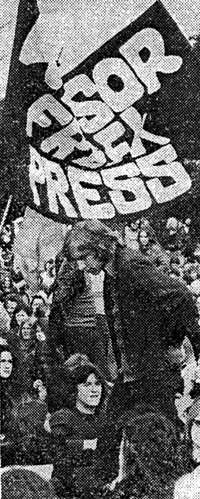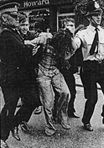Windsor: What
went wrong ?
INCREASED
pressure for independent inquiries into complaints against the
police has followed the affray at the pop festival at Windsor.
Critics of the present system point
out that the Home Secretary, Mr Roy Jenkins, will have to decide whether
or not to hold a public inquiry on the basis of a report prepared by
Mr David Holdsworth. Chief Constable of the Thames Valley Police. Yet
it was Mr Holdsworth who decided that the police should remove the pop
fans from Windsor Great Park on Thursday.
'Windsor is the perfect example of how the current machinery
is wrong,' said Mr Bill Nash legal officer of the national Council
for Civil Liberties.
Only two kinds of inquiry are possible
under the Police Act. 1964. Under Section 32, the Home Secretary can
order a full public inquiry -like the one under Lord Justice Scarman
into the Red Lion Square events. which opens in London tomorrow. Under
Section 49. the Chief Constable can call in a police officer from outside
his authority to investigate individual complaints against identified
officers.
'There's
no middle way,' said Mr Nash, 'and the trouble is that Mr Holdsworth can
hardly call in outside police to investigate policemen including himself.
Also, not many of the young people who complain of being mistreated
by the police will have identified the constables. So section 49 is no
use here. We need new machinery, a totally independent inquiry.'
Release,
the organization that aids people with drug problems, is also pressing
for a change of law that would create an element of independence in
police inquiries.
The Windsor fracas is not believed in
Whitehall to have the same political overtones as Red Lion Square, but
none the less the Home Secretary will be under pressure to answer or
refute the main allegations against the hard line treatment of the issue
by the Thames Valley Police.
Ignoring
the more paranoid complaints, the main allegations against the police
would appear to be these :
- That
there was no need to clear the fans out of Windsor Great Park last Thursday.
Owners of the land, the Crown Estates Commissioners, had not requested
removal, the Free Festival would anyway have ended three days later
and if the people were to be cleared this should have happened on the
first day.
- That
the police instructions to people to leave the site were not
clearly heard. The allegation is that many people did not realize
what the police wanted because few police loud hailers were
used.
- That
excessive force was used in clearing the site. The allegation
is that individual police lost their tempers or responded to
the provocation of being called 'pigs' over the festival's amplifiers.
The charge is that truncheons were used unnecessarily; and that
bystanders were harassed when trying to take numbers of constables.
- That
Drugs Squads police broke the law in searching Suspects. The
Misuse of Drugs Act 1971, stipulates that policemen must have
reasonable grounds for stopping and searching a member of the
public for drugs. -the allegation is that the Drugs Squad searched
Windsor fans at random. I witnessed a police road block near
the park . Cars or vans were directed by police into the front
yard of a house where the suspects were searched. The criteria
for selecting vehicles appeared to be their condition or decor:
vans with floral designs were a special target.
- That
unnecessary harshness was employed after arrests. Arrested people
were taken to the Combermere Army Barracks in Windsor,
where suspects were made to undress completely, put on heavy
pyjamas. and be subjected to anal and vaginal searches, according
to at least one doctor allowed into the barracks.
- That
the police refused lawyers access to defendants held in cells
or at Combermere Barracks. Solicitors employed by Release make
this charge. On Friday, the Army ended its arrangement with
the police whereby the barracks were used to hold suspects -partly
because of this charge, it is believed.
- That
police acted unreasonably in refusing bail before court appearances.
Release alleges that this tactic, plus detention in the barracks,
persuaded many people to plead guilty to get free as quickly
as possible.
|
 |
Police
spokesmen last week declined to go into detail in answering charges.
Chief Constable David Holdsworth said :'In my view Thames Valley Police
showed great restraint and patience during the course of this very difficult
operation '.
But the Home Secretary might be interested in an answer from
Mr Holdsworth as to whether police tactics changed between the start
of the festival and its break-up.
On the first day of the festival, police spokesmen were stressing
that they were anxious to take a low temperature approach to the festival.
'Our job is to keep the peace.' said Chief Inspector Dennis Howells,
Press and Liaison Officer for the Thames Valley Police.
|





